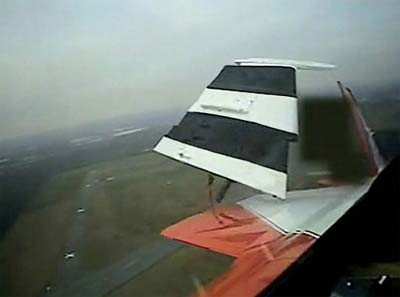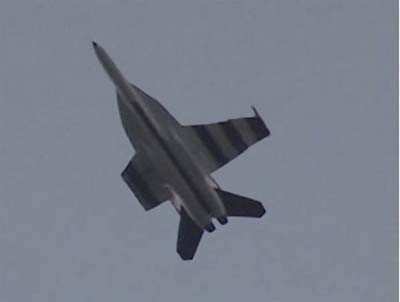Wed, Jun 11, 2008
Athena Technologies Brings Stricken Model Safely Back To
Earth
Rockwell Collins subsidiary Athena Technologies recently
completed a successful flight test of a significantly damaged
unmanned F/A-18 subscale model air vehicle. The Defense Advanced
Research Projects Agency (DARPA) sponsored the flight
demonstrations held this spring at the Aberdeen Proving Grounds in
Maryland.

During the first flight test, nearly half of the airplane's
right wing was ejected to simulate battle damage and in-flight
failure. During the second flight, almost 60 percent of the
airplane's right wing was ejected. Upon ejecting the wing section
during both flights, Rockwell Collins' Automatic Supervisory
Adaptive Control (ASAC) technology reacted to the airplane's new
vehicle configuration, automatically regained baseline performance,
continued to fly the plane, and then autonomously landed it using
internal Inertial Navigation System/Global Positioning System
(INS/GPS) reference only.
The flight test campaign followed a similar successful DARPA
sponsored demonstration in April 2007.
As ANN reported, during that test an aileron
was ejected in-flight from the unmanned subscale F/A-18.
"DARPA asked us to significantly increase the level of damage
and risk in this latest flight test campaign to really put the
Rockwell Collins controls technology through its paces," said Mike
Myers, vice president of Business Development for Rockwell Collins
Government Systems. "We are pleased with the ability of our
adaptive controls to instantly detect and react to the new vehicle
configuration after loss of major sections of the wing. The ASAC
controls technology enabled the airplane to continue to fly
completely autonomously without a hitch and land without further
damage."
Damage tolerance is an enabling capability for increasing the
mission reliability of UAVs operating in hazardous and high-threat
environments. The technology provides for real-time autonomous
accommodation of damage, followed by an adaptation process that
alters the flight control system to compensate for the effects of
the damage. During the flight test, Rockwell Collins demonstrated a
capability that could be applicable to all military aircraft
operating in combat environments and to commercial, business and
general aviation for full flight automation and backup.

"This demonstration highlights the challenge and importance of
autonomously controlling and landing an airplane that has sustained
catastrophic damage or failure in flight," said Dr. David Vos,
senior director of Control Technologies at Rockwell Collins. "This
powerful capability can save the military the expense of lost UAVs.
When applied to both manned and unmanned aircraft, damage tolerance
is a key technology that can facilitate the convergence of manned
and unmanned aircraft in increasingly crowded controlled airspace;
but more importantly, the solution can save lives."
More News
Also: ANOTHER Illegal Drone, KidVenture Educational Activities, Record Launches, TSA v Shoes The Senate confirmed Bryan Bedford to become the next Administrator of the FAA, in a ne>[...]
Also: Sully v Bedford, Embraer Scholarships, NORAD Intercepts 11, GAMA Thankful Middle Georgia State University will be joining the Federal Aviation Administration’s fight ag>[...]
Also: DarkAero Update, Electric Aircraft Symposium, Updated Instructor Guide, OSH Homebuilts Celebrate The long-awaited Sonex High Wing prototype has flown... the Sonex gang tells >[...]
Also: Sully v Bedford, Embraer Scholarships, NORAD Intercepts 11, GAMA Thankful Middle Georgia State University will be joining the Federal Aviation Administration’s fight ag>[...]
30-Year USCG Veteran Aviator Focusing On Member Benefits The Vertical Aviation International Board of Directors announced its new leadership officers in April, and all began their >[...]
 Airborne 07.11.25: New FAA Boss, New NASA Boss (Kinda), WB57s Over TX
Airborne 07.11.25: New FAA Boss, New NASA Boss (Kinda), WB57s Over TX Airborne-Flight Training 07.10.25: ATC School, Air Race Classic, Samson School
Airborne-Flight Training 07.10.25: ATC School, Air Race Classic, Samson School Airborne Affordable Flyers 07.03.25: Sonex HW, BlackShape Gabriel, PRA Fly-In 25
Airborne Affordable Flyers 07.03.25: Sonex HW, BlackShape Gabriel, PRA Fly-In 25 Airborne-Flight Training 07.10.25: ATC School, Air Race Classic, Samson School
Airborne-Flight Training 07.10.25: ATC School, Air Race Classic, Samson School Rick Kenin New Board Chair of VAI
Rick Kenin New Board Chair of VAI




